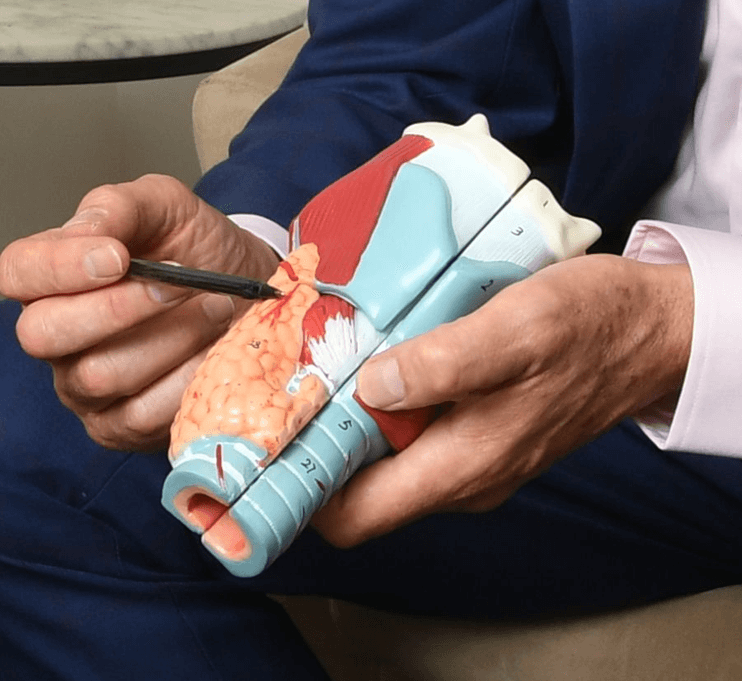Thyroid Lump and Thyroidectomy (Thyroid Surgery)
Thyroid lumps are common, sometimes cause symptoms especially if large and may cause concern. Dr. Hall will perform a thorough assessment including thyroid ultrasound and thyroid ultrasound guided FNA (needle biopsy) if required, diagnose the cause for your thyroid lump and discuss treatment options.
Thyroid nodules (lumps)
A thyroid nodule is simply a lump in the thyroid gland. It may be big or small. There may be one nodule or several nodules. Most thyroid lumps develop from an overgrowth of normal thyroid tissue and are not dangerous. However, around 5% percent of thyroid nodules are cancerous. An ultrasound scan of the thyroid will determine if the thyroid is enlarged and provide details of any nodules present. Thyroid nodules are assessed with a thyroid ultrasound and are graded using the tirads grading system from 1-5. A tirads 1 nodule is benign, while a tirads 5 nodule is highly suspicious for cancer. An ultrasound guided FNA (fine needle aspiration) needle biopsy may be required depending on the size and thyroid ultrasound characteristics (tirads grade) of the thyroid nodule. If your thyroid nodule is not cancerous and is not causing symptoms, then thyroid surgery is usually not required. If your thyroid nodule is a cancer or likely to be a cancer, thyroid surgery will be recommended.
What is my Thyroid Gland and what does it do?
The thyroid is a butterfly-shaped gland which lies low in the front of your neck, near the windpipe (trachea). It consists of two halves, each about the size of a cherry tomato. The thyroid produces an important hormone called thyroxine (T4). This hormone is essential for growth, development, and metabolism. It also helps contribute to the optimal functioning of essential organs in your body, such as the heart and brain.
The amount of T4 hormone that is produced in your body is controlled by another hormone Thyroid Stimulating Hormone (TSH). A simple blood test can measure the level of T4 and TSH you have in your body, and allows doctors like Dr. Hall to determine whether or not your thyroid is functioning properly.


What are the symptoms of a Thyroid Disorder?
Some common types of Thyroid Disorder include:
Hyperthyroidism
This occurs when your thyroid produces excess thyroid hormones. Too much thyroid hormone may result in feeling hot, irritable, agitated, and sweaty. Sometimes patients get palpitations, tremors, and bulging eyes. Hyperthyroidism can be treated with medication, radioactive iodine, or surgery.
Hypothyroidism
This occurs when your thyroid does not produce enough thyroid hormones. Too little thyroid hormone may result in feeling tired, sleepy, low in energy, cold or gaining weight. Hypothyroidism is easily treated with thyroid hormone tablets (thyroxine).
Goitres or Thyroid Lumps (Nodules)
A goitre is simply a big thyroid. Sometimes a big thyroid is composed of multiple nodules (lumps) in which case it is called a multinodular goitre. As the thyroid enlarges it may cause pressure symptoms such as discomfort, the feeling of a lump in the neck, breathlessness from compressing the trachea (windpipe), trouble breathing when lying down and trouble swallowing from compressing the esophagus (food passage). Some people are embarrassed by the appearance of their neck from a large goitre. Sometimes the goitre can extend inwards behind the sternum (breast bone) a condition called a retrosternal goitre. A large goitre is usually best removed, an operation called thyroidectomy.
Thyroid Cancer
The most common type of thyroid cancer is well-differentiated thyroid cancer and consists of papillary thyroid carcinoma and follicular thyroid carcinoma. With good treatment, both these cancers usually have an excellent prognosis with good long term survival. Other types of thyroid cancer include medullary and anaplastic thyroid cancer.
Thyroid cancer can occur at any age and affects women more often than men. Symptoms of thyroid cancer can include a thyroid lump, swollen neck lymph nodes, a hoarse voice, and swallowing or breathing difficulties.
The treatment of thyroid cancer is removal of the thyroid (thyroidectomy), sometimes removal of lymph nodes in the neck (neck dissection) and/or radioactive iodine (RAI).

How are thyroid lumps and big thyroids treated?
We know that the thought of treatment or surgery for a thyroid lump can be daunting, but rest assured, Dr. Hall is an expert in his field and will take you through your treatment plan in a way you understand and are comfortable with. Thyroid nodules (lumps) are assessed with thyroid ultrasound and frequently thyroid ultrasound guided needle biopsy (FNA). Patients with symptoms, cancerous nodules and nodules that are suspicious for cancer are treated with thyroid surgery.
Thyroidectomy
A thyroidectomy is a surgical procedure to remove your thyroid gland. Depending on your condition, either half (hemithyroidectomy) or all (total thyroidectomy) of your thyroid is removed. If the entire thyroid is removed, you will need to take daily thyroid hormone (thyroxine) replacement medication following the surgery, usually a tablet or two of thyroxine every day half an hour before breakfast.
Thyroid surgery is done under general anaesthesia (GA). Most patients undergoing thyroid surgery will stay overnight in hospital and may take up to 1 to 2 weeks to recover. Most patients do not find the post-surgery recovery particularly painful, but may find it uncomfortable.
An incision is placed in a skin crease on the neck, resulting in a less-visible scar. After a while, usually the scar is difficult to see.
Thyroid Lump (Nodule) Biopsy
If you’re diagnosed with a thyroid nodule(s), an ultrasound scan of the thyroid and ultrasound guided biopsy (FNA) may be conducted to help differentiate between benign (non cancerous) thyroid nodules and malignant (cancerous) thyroid nodules. A biopsy is a minor procedure, which uses a thin needle to obtain cells from a thyroid nodule which is then sent to a laboratory for testing.
After investigation, the thyroid nodules will fall into three general categories – benign, intermediate (possibly malignant) and malignant (cancer). Surgery (thyroidectomy) is recommended for the intermediate and malignant categories.
Radioactive Iodine
Some patients with thyroid cancer require radioactive iodine. Radioactive iodine is a drink taken about three months after surgery. Any remaining thyroid cells are usually destroyed from this supplement.
What are the risks of Thyroid surgery?
Dr. Francis Hall has performed hundreds of thyroid operations and takes the utmost care to avoid injury to surrounding neck structures during surgery. However, any surgery carries some risk. Complications are very uncommon. Some important complications to be aware of include:
Laryngeal nerve injury
Two nerves, the recurrent laryngeal nerve and the external branch of the superior laryngeal nerve are near the thyroid gland. If either nerve is injured, the patient may experience some hoarseness of the voice. Dr. Hall is especially careful to protect these nerves during the procedure and routinely uses recurrent laryngeal nerve monitoring and the harmonic scalpel to avoid such complications.
Low Calcium Levels
Four tiny glands called the parathyroid glands, are also located near the thyroid gland. If these glands or their blood vessels are affected, some patients may experience low calcium levels and calcium supplements will be required, usually this is temporary.
Bleeding
As with any operation, bleeding may occur. However, this is an unlikely complication after thyroid surgery.
Dr. Hall and thyroid surgery:
Dr. Hall has performed many thyroid operations. He attends the regional thyroid multidisciplinary meeting at Middlemore Hospital every month where patients with thyroid cancer are discussed. He has spoken at national and international meetings on thyroidectomy and thyroid cancer and has several articles on thyroid cancer in peer reviewed international journals.

